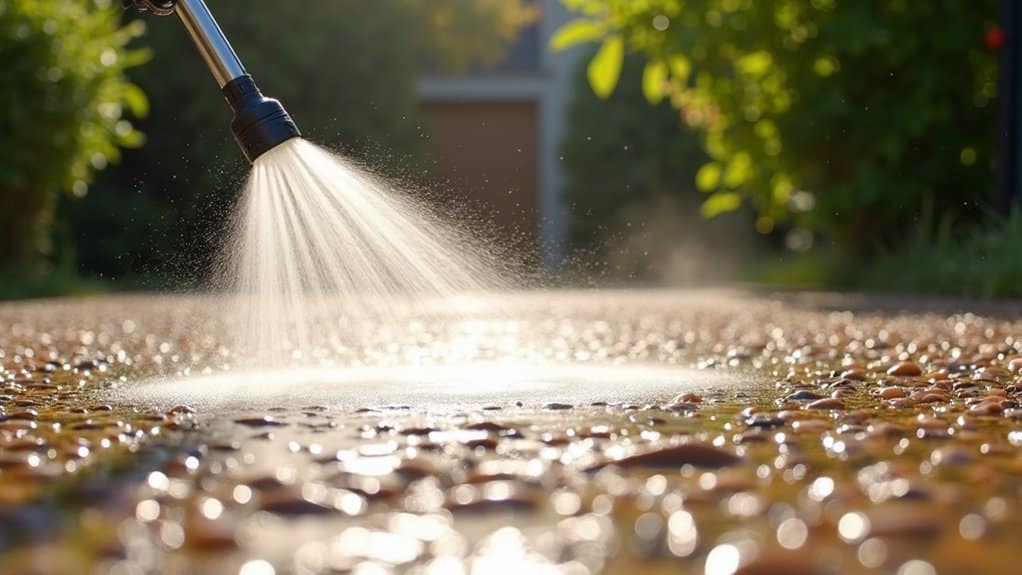Set your pressure washer to 1000-2500 PSI with a wide-angle (40°) nozzle to safely clean your resin-bound gravel patio. Keep the nozzle 30cm from the surface, using steady, sweeping movements to prevent damage. Before starting, clear the area and check for any cracks. Cover nearby plants, as the spray can harm them. Once finished, inspect the surface for potential issues. Regular maintenance will keep your patio looking fresh year-round.
Key Takeaways
Pressure Washing Your Resin-Bound Gravel Patio
Set your pressure washer between 1000-2500 PSI – about the same force as a strong garden hose. Too much pressure will damage the surface.
Choose a wide-angle 40° nozzle and keep about 30cm away from the surface – roughly an arm’s length. Think of it like painting with a spray can; you want even coverage.
Before starting, move your garden furniture and check for any dodgy spots or cracks. Best to sort these first rather than make them worse.
Work in smooth, overlapping strokes – rather like mowing the lawn. Don’t hover in one spot, as this risks lifting the resin.
After washing, give it a good look over for any problems. Regular sweeping keeps it tidy and stops moss taking hold – particularly important during damp British winters.
Understanding Resin-Bound Gravel Patios
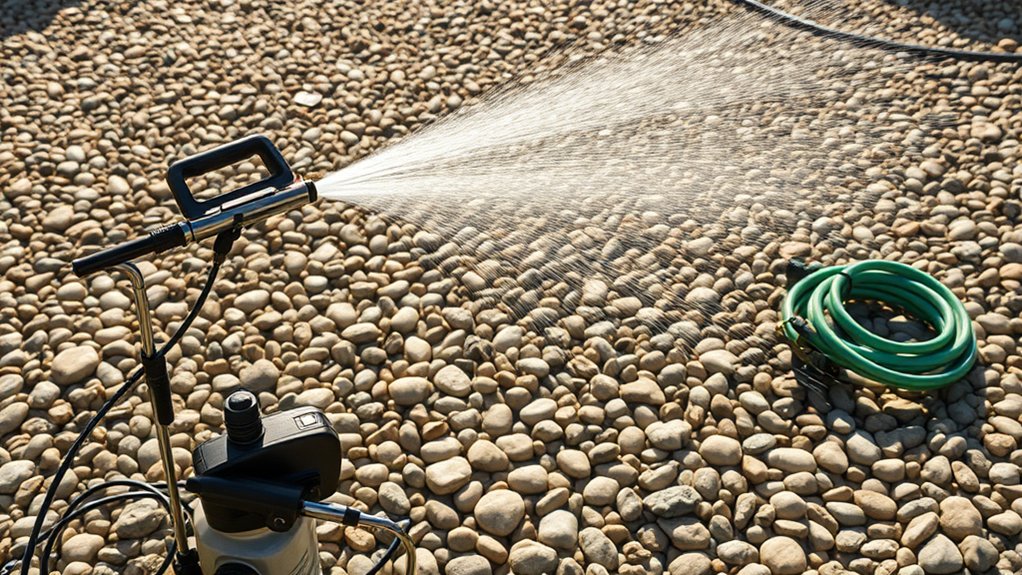
Resin-bound gravel patios offer both style and practicality for British homeowners. The system combines premium stone aggregates with UV-stable polyurethane resin, creating a robust surface that’s perfect for our varied weather. At 15-20mm thick, these patios resist cracks and scratches whilst handling everything from garden parties to parked cars. Much like traditional gravel but without the mess, resin-bound surfaces allow rainwater to drain naturally, helping prevent puddles during typical British downpours. This effective drainage solution is crucial in reducing flooding risks, especially during heavy rainfall. You’ll find plenty of colour options to match your home’s exterior, from warm Cotswold stone tones to contemporary slate greys. The finished surface stays smart and pristine with minimal upkeep – simply brush and occasional pressure wash to keep it looking fresh. Additionally, the anti-slip surface ensures safety for walking and driving, making these patios a practical choice for any outdoor setting.
Essential Pressure Washing Equipment
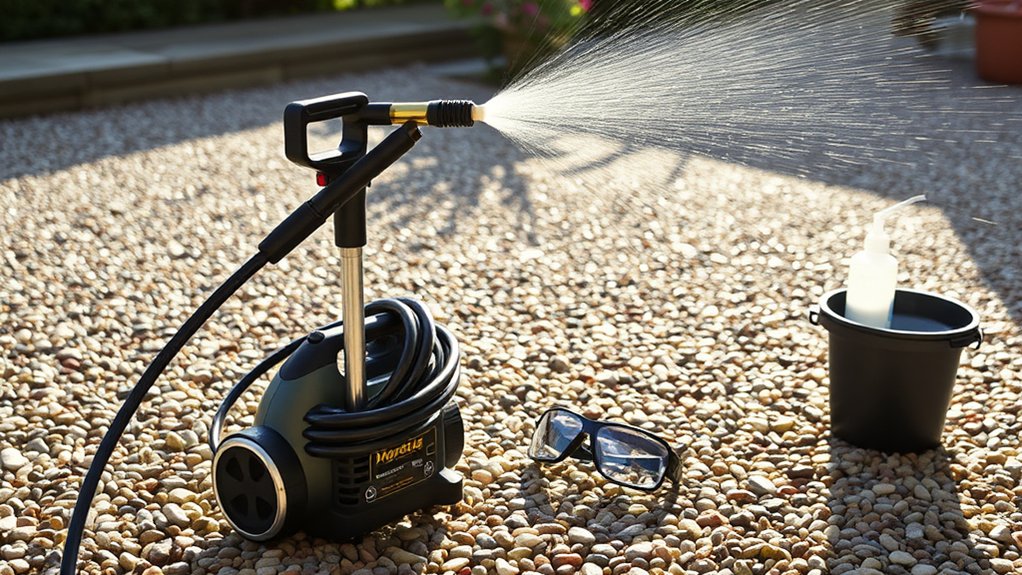
Essential Pressure Washing Equipment for Resin-Bound Driveways
The right kit ensures safe and effective cleaning of your resin-bound gravel patio:
| Equipment Type | Purpose |
|---|---|
| Pressure Washer | Select moderate units (70-170 bar) |
| Nozzles | Flat fan nozzles for controlled cleaning |
| Surface Cleaners | 45cm steel attachments for even coverage |
| Cleaning Agents | Use sparingly, only when necessary |
Choose a pressure washer with adjustable settings to suit different areas. It is important to use moderate pressure settings to prevent damage to the resin binder. Regular maintenance, including jet washing every 2-3 years, helps extend the lifespan of your patio. Skip turbo nozzles, and wear proper safety gear – protective goggles and sturdy gloves are essential. Quality equipment from trusted UK brands like Kärcher or Nilfisk will deliver reliable results and protect your investment in your patio.
Optimal Techniques for Pressure Washing
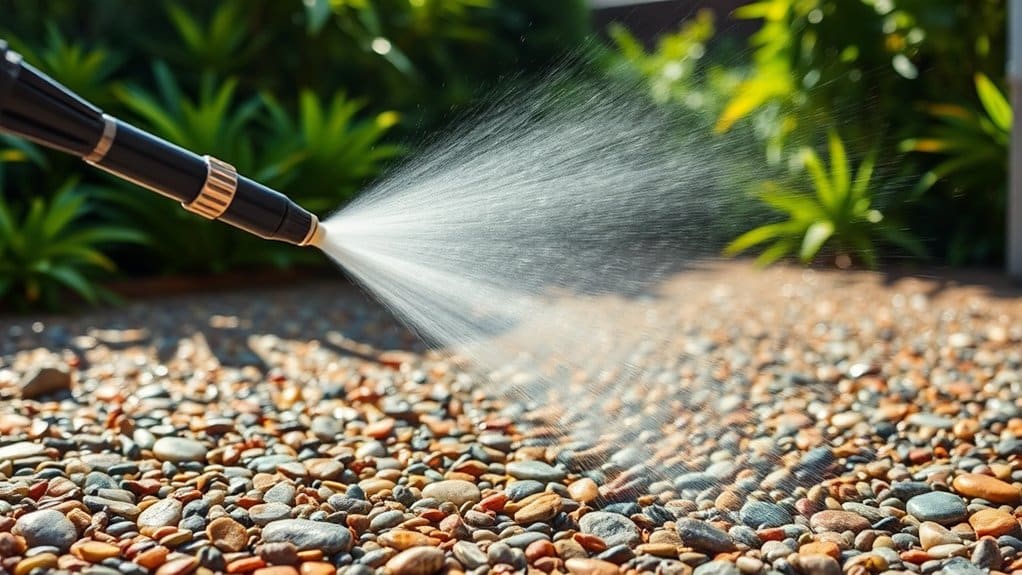
Using a pressure washer on resin-bound gravel requires careful technique to protect your patio whilst ensuring thorough cleaning. Select a wide-angle nozzle (40 degrees works best) and maintain a consistent distance of roughly 30cm from the surface. Work in methodical, overlapping strokes – much like mowing a lawn – moving from one end to the other. For tough marks like leaf stains or bird droppings, pre-treat the area with a specialist patio cleaner, let it soak for 10 minutes, then wash as normal. Remember to use the correct nozzle to avoid damaging the gravel surface, as a narrow jet setting risks dislodging the stones. Never use a narrow jet setting, as this risks dislodging the stones.
Proper Nozzle Selection
Proper Nozzle Selection for Resin-Bound Driveways
Choosing the right nozzle for pressure washing your resin-bound surface matters greatly. A 40° spray angle works best for most cleaning tasks whilst protecting the surface. Start gentle and adjust only when needed. Additionally, regular maintenance is crucial to ensure the longevity of your resin-bound surface.
| Nozzle Type | Suitable Spray Angle |
|---|---|
| Quick-connect nozzles | 40° for gentle rinsing |
| Flat fan nozzles | 25° for moderate cleaning |
| Rotary/turbo nozzles | Not recommended for resin |
Never use zero-degree nozzles – they’ll damage your resin surface. Match your nozzle size to your pressure washer’s GPM and PSI ratings for optimal cleaning. Think of it like watering plants: you wouldn’t blast them with a jet stream, and the same gentle approach works best for resin surfaces.
Effective Cleaning Patterns
The right nozzle starts your resin-bound gravel patio cleaning, but proper technique matters most.
Use gentle pressure settings between 1,000 and 2,500 psi to avoid damage. Keep your nozzle at least 30cm from the surface, moving in steady, overlapping sweeps – much like painting a fence. A fan nozzle works best, giving wider coverage than single-jet types.
Stick to cold water, as hot water risks damaging the resin bonding. Check the surface for any weak spots before you begin, and clean regularly to maintain your patio’s appearance.
It’s like maintaining a car – little and often beats occasional deep cleans.
Stain Treatment Techniques
First identify your patio stain – whether it’s mould, grease or mineral build-up. The right cleaner makes all the difference: use alkaline detergents for greasy marks and acidic solutions for rust spots.
Apply your cleaning solution with a gentle spray to protect the resin-bound surface, much like washing a car. Start with problem areas first, then tackle the whole patio to stop stains spreading.
Work methodically in small sections using a wide spray pattern, similar to painting a wall. These simple steps keep your patio spotless without risking damage to the surface.
Surface Preparation and Safety Precautions
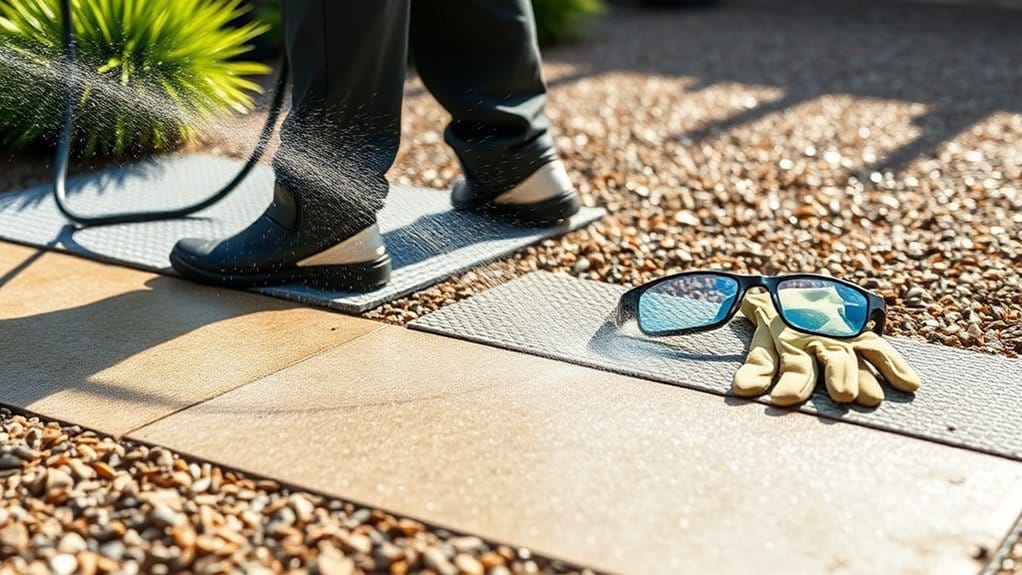
Clear all objects from around your resin-bound gravel patio before pressure washing.
Check thoroughly for cracks or loose areas – these could worsen under high pressure.
Test your cleaning solution on a small, hidden patch first to ensure it’s suitable for the surface.
Clear Surrounding Areas
Before pressure washing your resin-bound gravel patio, clear the area thoroughly to ensure safe, effective cleaning.
Move garden furniture well away from the space and cover nearby plants and surfaces with tarpaulins or plastic sheeting to protect from spray.
Pick up any rubbish, fallen leaves or loose items that might get in the way.
If you’ve got children’s toys or pet bowls about, pop these somewhere safe.
Put up some barriers or warning signs to keep people at a distance whilst you work.
These simple prep steps will help avoid any mishaps and make the job much easier.
Inspect for Damage
Essential Damage Checks for Your Resin Driveway
Regular inspection of your resin-bound surface helps spot problems early and avoid costly repairs. Check these key areas:
1. Look for Visible Problems****: Spot any cracks, loose stones or patchy areas.
Watch for water puddles that shouldn’t be there.
2. Check the Base: Give the surface a firm press to ensure it’s solid underneath.
Good drainage stops water sitting about – crucial for British weather.
3. Weather Damage: Our climate can be harsh on resin surfaces.
Look out for rusty marks, green patches of moss (common in shaded spots), or faded areas from sun exposure.
Best to check after heavy rain or extreme weather when problems are most visible.
Test Detergent First
Test your chosen detergent on a small patch of your resin-bound gravel patio before full application.
Stick to mild cleaners like washing-up liquid, as harsh chemicals can damage the resin.
Apply a small amount to an out-of-sight area and check for any adverse reactions.
If it’s safe, mix the detergent according to the manufacturer’s guidelines.
Always rinse the surface thoroughly afterwards to prevent any soap residue from building up.
Much like testing new skincare on your wrist, this careful approach helps protect your patio’s finish and longevity.
Common Mistakes to Avoid

Common Pressure Washing Mistakes
Three critical errors to avoid when cleaning your resin-bound gravel patio:
1. Using Too Much Pressure: Keep between 1000-2500 PSI – much like washing your car, gentle is better.
Higher settings will damage the resin and scatter your gravel.
2. Wrong Nozzle Choice: Opt for wide-angle (40°) nozzles or surface cleaner attachments.
Think of it like watering plants – you want a spray, not a jet.
3. Poor Technique: Stand about a metre away and use steady, sweeping movements – similar to painting a fence.
Concentrated blasting in one spot will create unsightly marks and grooves.
Post-Washing Maintenance Tips
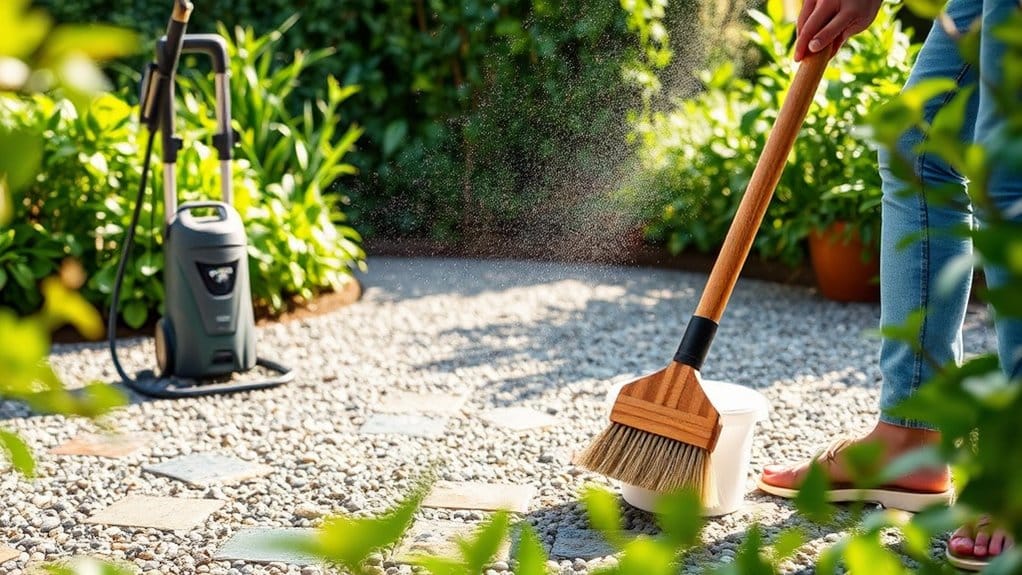
Post-washing care for your resin-bound gravel patio requires regular attention to maintain its condition.
Check for cracks or weak spots straight after cleaning, sorting any issues quickly to prevent bigger problems.
Let the surface dry thoroughly, particularly during British weather when dampness lingers.
A good sweep with a stiff-bristled broom twice weekly keeps debris at bay and stops moss taking hold.
For patios tucked away under trees or in shady spots, you’ll need to sweep more often.
Pop a bit of moss killer down before autumn and winter sets in – it’s far easier than tackling a full-blown moss problem later.
Stick to these basics, and your patio will stay tip-top for years to come.
Recommended Tools for Routine Cleaning
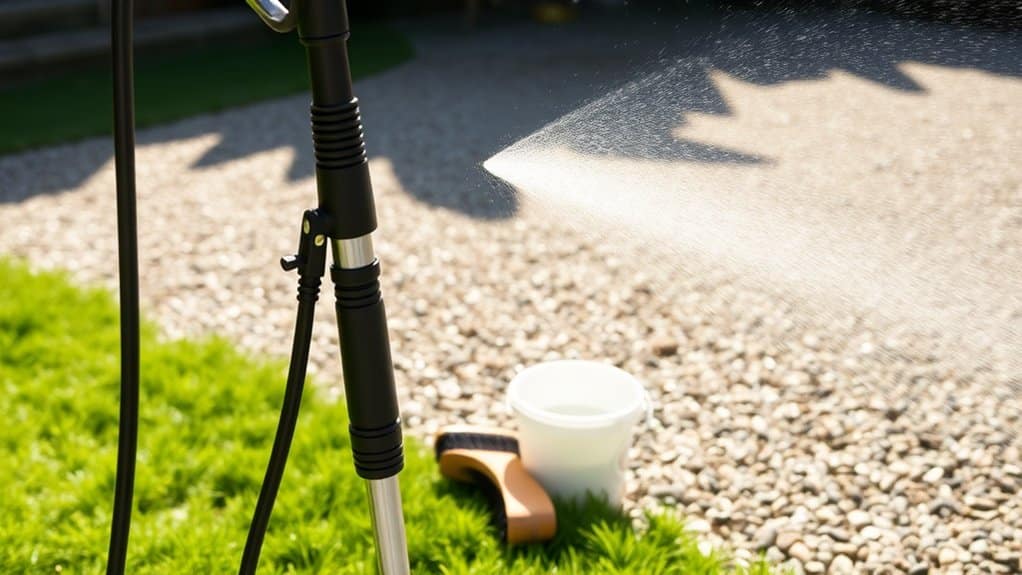
Essential Tools for Resin-Bound Gravel Maintenance
Regular cleaning keeps your resin-bound driveway or patio in top condition and prevents long-term damage.
Three key tools for effective maintenance:
- Sturdy Outdoor Broom: A robust broom with firm bristles shifts everyday debris like fallen leaves and dirt between deep cleans.
- Pressure Washer: A medium-power pressure washer (1,000-2,500 psi) works best. Stick to cold or lukewarm water to protect the resin bonding.
- Fan-Style Nozzle: The wide spray pattern prevents surface damage whilst ensuring thorough cleaning. Essential for safe, even coverage.
When to Seek Professional Help
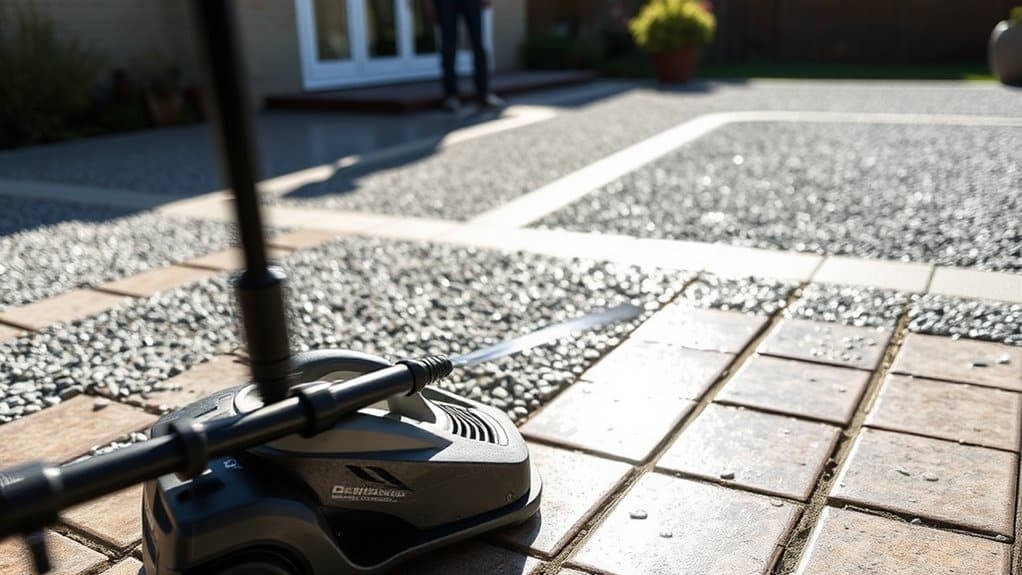
Professional Help: When to Call
Regular upkeep keeps most resin-bound driveways and patios in good nick, but sometimes you’ll need an expert.
Contact a professional if you spot:
- Noticeable discolouration
- Resin coming away from the surface
- Rough or uneven patches
- Stubborn stains that won’t shift
Large areas often need industrial cleaning kit that you simply can’t buy on the high street.
Professional cleaners use specialist rotary equipment that’s both effective and gentle on the surface.
If harsh chemicals have damaged your patio, specialists can assess the problem and use suitable cleaning solutions.
Getting help early typically works out cheaper than waiting until repairs are needed.
Plus, proper professional maintenance helps your patio last longer.
Frequently Asked Questions
Can I Use Bleach for Cleaning Resin-Bound Gravel Patios?
Using bleach on resin-bound gravel patios isn’t recommended, as it can fade the surface and harm nearby plants and soil. Try pH-neutral patio cleaners or specialist resin-bound surface products instead. A regular sweep and occasional pressure wash will keep your patio looking fresh without risking damage to the material.
How Often Should I Pressure Wash My Patio?
Regular pressure washing isn’t always necessary for your patio. Once or twice a year is typically sufficient for most UK homes, ideally in spring after winter grime and autumn after summer use. Additional cleans might be needed if you spot stubborn stains, moss growth or heavy leaf fall. Just ensure you’re using the right pressure setting to avoid damaging the surface.
Will Pressure Washing Remove Weeds From the Patio?
Pressure washing helps shift surface weeds and debris on your patio, but won’t sort out deep-rooted problems. Think of it like giving your patio a good shower – it’ll clean the top, but won’t tackle what’s growing underneath. For best results, combine pressure washing with proper weeding by hand and keep your patio clear of leaves and debris to stop new weeds taking hold.
Is It Safe to Wash My Patio in Direct Sunlight?
Washing your patio in direct sunlight isn’t advisable as the cleaning solution dries too quickly, leaving behind streaks and residue. For best results, tackle the job during cooler periods – early morning or late afternoon work brilliantly. This approach ensures proper cleaning and helps protect your patio’s surface, whether it’s concrete, stone or decking.
Can I Use a Pressure Washer on Other Surfaces Like Concrete?
Pressure washers work brilliantly on concrete surfaces, including driveways and patios. Just ensure you’re using the correct pressure setting and nozzle to prevent surface damage. They’re particularly effective at shifting stubborn moss, algae and oil stains that often plague British concrete surfaces.
Conclusion
Keep your resin-bound gravel patio in top condition by following proper pressure washing techniques. Using too much pressure or incorrect methods risks damaging the surface, so it’s worth taking care to do the job properly. If you’re unsure about tackling it yourself, professional cleaning services specialise in this type of surface and can ensure the work is done correctly. Remember: gentle pressure and proper technique preserve both the appearance and integrity of your patio.
